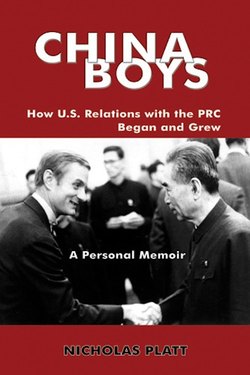Читать книгу CHINA BOYS: How U.S. Relations With the PRC Began and Grew. A Personal Memoir - Nicholas MD Platt - Страница 6
На сайте Литреса книга снята с продажи.
School Influences
ОглавлениеSt. Paul’s shaped me. My Japanese friends provided a look beyond the swarm of WASPs (slang for white Anglo-Saxon Protestants) who were my classmates. I learned to love history under the gruff, incisive discipline of a teacher named Carroll McDonald. The chance to observe history in the making would later pull me into diplomacy. So would the SPS connection with a Peace Corps forerunner in England called the Winant Volunteers.
John Winant, the revered U.S. ambassador to the Court of St. James’s during World War II, had been a master at St. Paul’s before becoming governor of New Hampshire. He committed suicide at the end of the war, as much a casualty of the conflict as any battlefield death. His friends in Britain, led by a spellbinding evangelist named Tubby Clayton, organized in Winant’s memory a summer program for college and high-school-age volunteers to help rebuild London’s war-damaged East End. Clayton’s first recruiting stop was SPS in the late 1940s. I remember sitting in the school’s chapel, a callow choir boy, mesmerized by Tubby’s descriptions of London ravaged, of Winant’s craggy appearances at blazing scenes during the Blitz (firefighters reported seeing Abraham Lincoln), and the need to rebuild. I told myself I just had to join the Volunteers. Several years later I did.
The summer before my sophomore year at Harvard, I was sent to work as a Winant Volunteer at the Brady Boys’ Club, the world’s oldest Orthodox Jewish Boys’ Club, in the heart of East London. I learned to communicate in their patois of English, Yiddish, and Cockney rhyme slang. (I nearly lost my newfound status as an honorary Jew when I tried to put mayonnaise on chopped liver.) Living abroad turned out to be fun and fascinating. Explaining the United States and its policies to kids from a different culture was a challenge. Persistent nagging by my Cockney kids to tell them what I planned to do with my life set me searching for an adult analog to my current work. I returned to college with my cap set for the Foreign Service.
In addition to intellectual rigor, SPS served up an exhausting array of things to do. I sang, boxed, rowed, and was part of the student government. The impact of these activities on the way I operated later in life, particularly rowing, was huge. My management style as an ambassador and a bureaucrat, which treasured teamwork and measured progress one stroke at a time, was formed in a racing shell.
